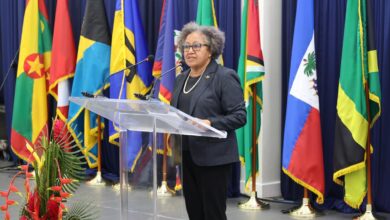|
The Thirteenth Caribbean Community (CARICOM)-Japan Consultations on their bilateral cooperation arrangements was convened in Barbados on 19 March 2009. The CARICOM delegation was led by His Excellency Anthony Liverpool, Non-Resident Ambassador of Antigua and Barbuda to Japan and the delegation of Japan was led by His Excellency Ambassador Tatsuaki Iwata, Representative of the Government of Japan.
The CARICOM delegation was comprised of representatives of the Governments of Antigua and Barbuda, Barbados, Belize, Grenada, Guyana, Jamaica, Suriname, and Trinidad and Tobago; and representatives of the following Regional Organisations: CARICOM Secretariat, Caribbean Agricultural Research and Development Institute (CARDI), Caribbean Disaster Emergency Management Agency (CDEMA), CARICOM Development Fund (CDF), Caribbean Regional Fisheries Mechanism (CRFM), Caribbean Institute for Meteorology and Hydrology (CIMH), Caribbean Tourism Organisation (CTO); and the University of the West Indies (UWI). RESPONSE TO GLOBAL ECONOMIC AND FINANCIAL CRISIS Both sides reviewed the impact of the ongoing global economic and financial crisis on their respective economies. Emphasising the deleterious effect of the crisis on developing countries and the need for a joint approach at the regional and international levels, CARICOM called on Japan to lend its support for urgent and comprehensive reform of the international financial architecture in a manner that responds to the interests of both developing and developed countries. CARICOM advocated international recognition of CARICOM Member States as small vulnerable economies, many of which are highly indebted middle income countries, and in this regard reiterated the need for reform of the eligibility criteria for Official Development Assistance (ODA). CARICOM also emphasized the importance of the financial services sector to Caribbean economies. Japan was requested to support these positions at the forthcoming London Summit on 2 April 2009. The Meeting noted Japan’s commitment to work with CARICOM to forge innovative approaches to respond to the global economic and financial crisis. CARICOM INTEGRATION The Japanese delegation was updated on the progress of the regional integration process and reiterated its support for the integration efforts of the Region. CARICOM DEVELOPMENT FUND (CDF) The integral nature to the CARICOM Single Market and Economy (CSME) of the recently established CARICOM Development Fund was noted. Japan expressed its intention to give consideration to how best it could support the CDF, including cooperation in concrete projects funded by the CDF. REVIEW OF THE NEW FRAMEWORK FOR CARICOM-JAPAN COOPERATION FOR THE TWENTY-FIRST CENTURY Both sides reviewed the cooperation between CARICOM and Japan and the progress made on projects since the Twelfth Consultation in August 2007 in such areas as fisheries, disaster management, the environment, tourism and agriculture. In the area of the environment and disaster prevention, Japan highlighted the extension of the “Caribbean Disaster Management Project” to a second phase focusing on enhancing Flood Hazard Mapping and Community-Based Disaster Planning. A fisheries project proposal to develop a Master Plan for the Sustainable Use of Fisheries Resources in the Caribbean was finalized during the first quarter of 2009. Japan renewed its commitment to continue its cooperation with the Community in these critical areas. COOPERATION IN INTERNATIONAL FORA Both sides emphasised the need for continued cooperation in international fora. In the exchange of views on UN issues, the Japan Side reiterated the need to realise as early as possible the reform of the UN Security Council with the expansion of the permanent and non-permanent membership. CARICOM reiterated the importance it attaches to ensuring that the inter-governmental negotiations on the reform should be conducted in an open, inclusive, transparent and democratic manner. Japan emphasised the need to take necessary actions toward the non-nuclearisation of North Korea and the importance of resolving the abduction issue of Japanese nationals as the top priority of the Government of Japan. Japan called for the support of CARICOM Member States for the next UN resolution on the “Situation of Human Rights in North Korea” and the extension of the mandate of the Special Rapporteur of Human Rights. Japan requested CARICOM Member States’ support for its candidature to the Executive Board of UNESCO at the elections to be held in October 2009, reiterating its financial and human resource contribution to the activities of UNESCO. CARICOM similarly informed of its slate of candidatures to UNESCO and requested the support of Japan. CLIMATE CHANGE The two sides exchanged views on the issue of Climate Change, recognising the significant risks that Climate Change presents to the sustainable development of Small Island Developing and Low Lying Coastal States. They reaffirmed their commitment to collaborating in international fora to the development of an effective post-2012 framework. Japan explained the “Cool Earth Partnership” initiative, stressing the following three points –
Japan also informed of their support for the Climate Investment Fund and the financial resources to be committed through the Cool Earth Partnership to address adaptation and mitigation activities of developing countries. CARICOM expressed its intention to actively participate in the international processes toward the formulation of an effective post-2012 framework and reiterated its support for the AOSIS position. CARICOM informed of the Avoided Deforestation Initiative which is a part of the Regions’ climate change strategy. CARICOM also requested the support of Japan for the establishment of the Adaptation Fund to be discussed at the COP-15 in Copenhagen in December 2009. PREPARATIONS FOR THE CARICOM-JAPAN MINISTERIAL MEETING CARICOM and Japan decided to work towards the convening of a Meeting at the Ministerial level. The date and venue of the Fourteenth CARICOM-Japan Consultations will be determined at a later date. |
|
Press ReleasesStatements and Declarations





